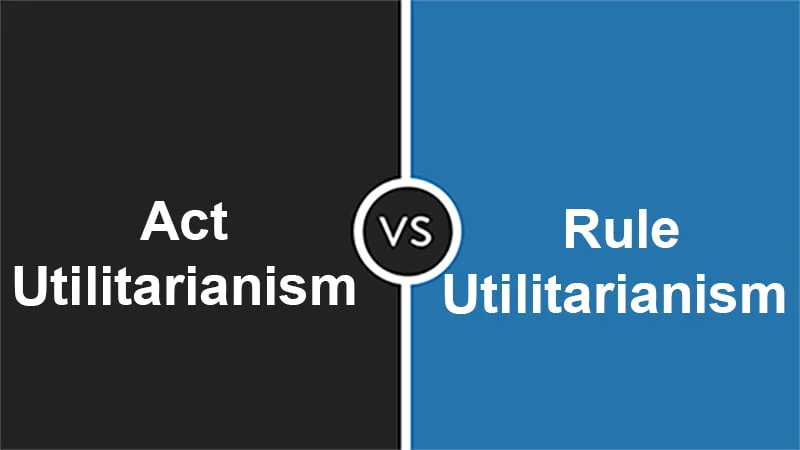“The greatest happiness of the greatest number” is the ultimate moral standard of utilitarianism. It judges all actions according to their utility as means for the promotion of general happiness or prevention of general pain.
It is a theory in which morality of action depends upon their effect on the people. Act Utilitarianism and Rule utilitarianism are two parts of utilitarianism theory.
Act Utilitarianism vs Rule Utilitarianism
The main difference between Act Utilitarianism and Rule Utilitarianism is that Act Utilitarianism is the belief in actions that are done for the greatest number for the greatest happiness, which becomes morally right. At the same time, Rule utilitarianism is the belief that actions are done with correct rules, and then that action becomes morally right.

Act utilitarianism is a notion that believes the utility knows the morality of an action of most people. If such actions have a consequence that is beneficial for most people, then such action is considered morally right. It brings greater good or happiness.
Rule utilitarianism is the notion that the morality of an action can be right if it conforms to the rules that lead to greater good or happiness for humanity. These rules should increase the utility and happiness of the maximum number of people and apply without exception.
Comparison Table Between Act Utilitarianism and Rule Utilitarianism
| Parameter of Comparison | Act Utilitarianism | Rule Utilitarianism |
| Action | Act utilitarians consider action case by a case basis | Rule utilitarians consider general rules, not any particular action |
| Utility | Act utilitarians would calculate utility each time when the act is performed. | Rule utilitarians would calculate the overall utility of accepting or rejecting the rule |
| Morality | Act utilitarians consider action on a case basis | Act utilitarians would take morality as the influence of good action that benefits most people |
| Results | Act utilitarians would take results on the action | Rule utilitarians would take morality as following rules that benefit most people |
| Consequences | Act utilitarians are unable to predict consequences accurately | Rule utilitarians may predict consequences accurately |
What is Act Utilitarianism?
It is a theory that determines the morality of action through its usefulness to the greatest number of people. If any right action gives the greatest good to most people, it is morally right and ethically correct because it follows the greatest happiness. That’s why Act utilitarianism is seen as the natural elucidation of utilitarian ideals.
Jeremy Bentham provided this type of utilitarianism in his description of a “hedonic calculus,” which was meant to show what factors should be used to determine amounts of pain and suffering, pleasure and happiness. Using this concept of utilitarianism, Bentham would allow for making a correct judgment.
In this, every action or decision could be judged based on the actual consequences of options. It provides a method for showing whether moral questions are true or false. Still, they maintain that they should violate the rules whenever a person does maximum good by violating them. There is no reason to obey rules for more well-being.

What is Rule Utilitarianism?
Rule utilitarianism emphasizes following the moral code of principle, which is the most efficient way to greater happiness or goods. It is a theory that says if an action is done according to rules, then it can be morally right, and they also believe that the correctness of rules determines the rightness of an action.
Rule utilitarians try to maximize utility only by setting up moral codes that contain rules. In this, judging individual actions by seeing how they conform to these codes of principle. They do not evaluate individual action but support those rules whose acceptance would maximize the utility.
They believe if following rules does not give the greatest outcomes, then not following will not produce the greatest outcomes either. Finally, it becomes act utilitarians if not following gives the greatest good.
Rule utilitarians evaluate action through the consequences of its universal practice. The most common example of rule utilitarianism is traffic rules, in this condition, the morality of an action can be measured through the universal consequences of the results of following rules and regulations.

Main Differences Between Act Utilitarianism and Rule Utilitarianism
- Act utilitarianism is a theory that highlights the morality of an action is determined by its usefulness to the people. In contrast, rule utilitarianism is a theory that highlights the morality of action through following certain rule that gives the greatest good or happiness to most people.
- Act utilitarianism stresses the specific context and individual features that contain moral problems. In contrast, Rule Utilitarianism stresses the recurrent features of human life and how similar problems arise.
- Under act utilitarianism, morality is the impact of action that gives an advantage to many people. In contrast, in rule utilitarianism, morality follows certain rules of conduct that benefit maximum people.
- Act utilitarianism looks at the consequences of individual acts each time, whereas rule utilitarianism looks at the consequences of following rules every time.
- In act utilitarianism, there is no guidance when the individual faces a moral decision problem, whereas, in rule utilitarianism, the individual has the benefit of receiving way or guidance from the past rules, which show to give the greatest good or happiness for the greatest number.
Conclusion
This debate on the difference between Act Utilitarianism and Rule Utilitarianism gives many important issues, like how to make moral goodness and how an action is morally right. The difference is that act utilitarianism stresses the consequences of action and utility calculation each time. In contrast, rule utilitarianism stresses the result of following rules of conduct of morality.
Both perspectives determine right and wrong in action between what we do from the moral code and what is an impression of our moral perspective on the level of the greatest good or happiness.